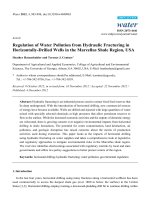Well Completion and Hydraulic Fracturing Methodology Explained
Bạn đang xem bản rút gọn của tài liệu. Xem và tải ngay bản đầy đủ của tài liệu tại đây (1.7 MB, 22 trang )
Well Completion and Hydraulic Fracturing
Methodology Explained
Kevin Rice
© 2012 Baker Hughes Incorporated. All Rights Reserved.
AAEE Workshop – May 14
th
, 2012
Well Construction Process
• Drilling
• Completion
– Cementing
– Perforating
• Hydraulic Fracturing
– Conventional
– Unconventional
© 2012 Baker Hughes Incorporated. All Rights Reserved.
2
Drilling – general statistics for US Land
• Depths up to 35,000 ft., vertically
• Almost 65,000 new wells in the US 2011
• US land-based rig count at the end of
April 2012
• 613 Gas (31%)
• 1328 Oil (69%)
• Less than two weeks to drill a new well
© 2012 Baker Hughes Incorporated. All Rights Reserved.
3
Drilling Process
• Drilling Rig
– Controls the downward force on the bit
– Supports the drill string or casing as new joints are added
• Vertical Drilling
– Power comes from the rotatory platform on surface
• Horizontal Drilling
– MWD (Measurement While Drilling)
– LWD (Logging While Drilling)
– Downhole drill motors
4
© 2012 Baker Hughes Incorporated. All Rights Reserved.
Photo Courtesy Brad Cole – Geology.com
Drilling Fluids (Muds)
5
© 2012 Baker Hughes Incorporated. All Rights Reserved.
• Circulated down the drill stem and up the annulus
• Jetted to high flow rates at the bit
• Key functions:
– Control formation pressures
– Remove cuttings
– Lubricate the bit
– Control leak-off
• Muds are recirculated and periodically reconditioned
Cementing Principles
• Provide a permanent bond between the
casing and the formation
• Performed in stages to provide wellbore
stability and isolate zones
• Cement is pumped down the inside of the
casing and up the annular space
• Key steps include:
– Ensure bonding by both chemical and mechanical
techniques
– Centralize the casing in the open hole
© 2012 Baker Hughes Incorporated. All Rights Reserved.
6
Cementing Stages
Generally consists of four components:
• Conductor casing
– Less than 100 ft
– Isolate shallow groundwater
• Surface casing
– Surface to 5,500 ft, typical
– Isolate groundwater aquifers
– Marcellus typically less than 500 ft
• Intermediate casing
– Surface to 16,000 ft, typical
– Isolate subsurface formations
• Production casing
– Surface to 20,000 ft or deeper
– Isolate production zone from other formations
– Contain hydraulic fracturing, production strings, etc.
© 2012 Baker Hughes Incorporated. All Rights Reserved.
7
Cementing Measurements
Prior to Placement
• Thickening Time – Cement placement
• Compressive Strength – Casing support
• Gel Strength – Resistance to reservoir fluids
• Viscosity – Flow requirements
• Fluid Loss – Water lost to the formation
8
© 2012 Baker Hughes Incorporated. All Rights Reserved.
After Placement
• Positive or Negative
Pressure Test – Cement
integrity
• Cement Bond Log –
Cement integrity
During Placement
• Density – Control pressures
• Rate and Pressure –
Compare to expectations
Completion Tools
• Perforating
– Punctures casing to create flow path
– Isolates zone with packer or fill
• Sliding Sleeve
– Isolates and accesses openings in one process
9
© 2012 Baker Hughes Incorporated. All Rights Reserved.
Hydraulic Fracturing Process
Conventional Oil and Gas
• Initiate a fracture by pressuring fluids to the breakdown
pressure of the formation
• Pump fluid into the fracture to create width & length
• Add sand or other proppant to be transported into the fracture
• Reduce the pressure and allowing the fracture to close
• Flow the fluid back out of the fracture
while the proppant stays in place
© 2012 Baker Hughes Incorporated. All Rights Reserved.
10
Why Fracture?
© 2012 Baker Hughes Incorporated. All Rights Reserved.
11
Radial Flow – Flow converges
Linear Flow – No converging
Production Increase
© 2012 Baker Hughes Incorporated. All Rights Reserved.
12
In 1960 experiments were conducted
by McGuire and Sikora with an
electrical resistance grid to simulate
the reservoir production increases by
fracturing
Wellbore
Lowered resistance to simulate
fracture conductivity
Production increases with length and
width of fracture
Fractures are created, then held open
with a proppant, creating a conductive path
Fracturing Proppants
Ceramic
Sand
© 2012 Baker Hughes Incorporated. All Rights Reserved.
13
Fracture Mechanics
• Fracture Initiation
– Exceed breakdown pressure
• Fracture Growth
– Circular initial growth, Height = Length
– Direction based on formation stress
14
Frac Height: 50 to
200 feet
Frac Width: ½ inch
Frac Length: 500 to
1500 feet
© 2012 Baker Hughes Incorporated. All Rights Reserved.
Fracture Growth
15
© 2012 Baker Hughes Incorporated. All Rights Reserved.
Shape and Containment
Intersection with natural fractures
Hydraulic Fracturing Fluid Properties
• Low pumping friction (low viscosity)
• Create fracture width (low to high viscosity)
• Transport proppant (high viscosity)
• Control leak off
16
© 2012 Baker Hughes Incorporated. All Rights Reserved.
Fracturing Matrix
17
1000 to 0.5 md
Sandstone
Fracturing used to
stimulate production
0.5 to 0.001 md
Brick, Concrete
Fracturing required
for production
0.001 to 0.000001 md
Granite, Shale
Fracturing required
for production
Horizontal Drilling
required for
production
Conventional Tight Gas Unconventional
Fracturing Categories
© 2012 Baker Hughes Incorporated. All Rights Reserved.
Unconventional (Shale) Fracturing
• What is shale?
– Mudstone, siltstone, shale stone
– Source rock for nearby oil and gas bearing formations
– Very fine grain size, extremely low permeability
– Tends to be highly fractured
• Natural gas resides
– Within the natural fractures
– Adsorbed on the surface
– Within the porosity
• How do we fracture shale?
18
Shale outcropping
© 2012 Baker Hughes Incorporated. All Rights Reserved.
Shale Fracturing
© 2012 Baker Hughes Incorporated. All Rights Reserved.
19
• No longer about just fracture width and length – now we
build a network of new and existing fractures
• The goal is Stimulated Reservoir Volume (SRV)
• Requires horizontal drilling, multistage fracturing and a
fracture network
Producing Formation
Fracturing Network
• Currently developing and evaluating different techniques to
alter the near wellbore stress field and promote more
secondary fractures
• The average number of stages per well in 2011 was 16+
Clustering method
Alternating clusters in adjacent wells
20
© 2012 Baker Hughes Incorporated. All Rights Reserved.
Summary:
• Hydraulic fracturing is necessary to develop shale gas but
it is not a standalone process
• The key developments to successfully produce from shale
formations include:
– Measurement while drilling
– Logging while drilling
– Downhole drilling motors
– Multistage completions tools
– Fracture network techniques
21
© 2012 Baker Hughes Incorporated. All Rights Reserved.
Fracture Height Growth in Marcellus
© 2012 Baker Hughes Incorporated. All Rights Reserved.
22
From SPE 152596 Hydraulic Fracturing 101 by George King, Feb 2012









